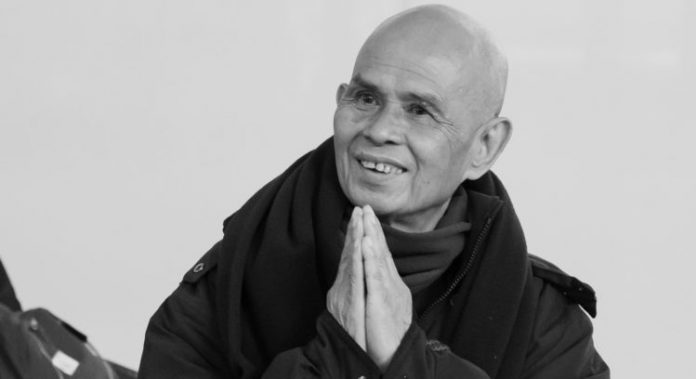We’ve all asked the question, “what is happiness?”
Is it a feeling? Having stable circumstances in life? Or is it something that’s deeply personal and can’t be defined?
Well, according to Buddhist master Thich Nhat Hanh, it’s simply a way of being.
In fact, in a simple, but profound quote below, Thich Nhat Hanh says that true happiness is based on inner peace:
“Many people think excitement is happiness…. But when you are excited you are not peaceful. True happiness is based on peace.”
Thich Nhat Hanh says that acceptance is an important part of being peaceful. Yet, in western society, too many people try to change themselves for other people.
However, this is futile to our own inner peace and happiness:
“To be beautiful means to be yourself.You don’t need to be accepted by others. You need to accept yourself. When you are born a lotus flower, be a beautiful lotus flower, don’t try to be a magnolia flower. If you crave acceptance and recognition and try to change yourself to fit what other people want you to be, you will suffer all your life. True happiness and true power lie in understanding yourself, accepting yourself, having confidence in yourself.”
Thich Nhat Hanh says that to achieve acceptance, we need to start embracing the present moment and the beautiful miracles that exist around us:
“When we are mindful, deeply in touch with the present moment, our understanding of what is going on deepens, and we begin to be filled with acceptance, joy, peace and love…Around us, life bursts with miracles–a glass of water, a ray of sunshine, a leaf, a caterpillar, a flower, laughter, raindrops. If you live in awareness, it is easy to see miracles everywhere. Each human being is a multiplicity of miracles. Eyes that see thousands of colors, shapes, and forms; ears that hear a bee flying or a thunderclap; a brain that ponders a speck of dust as easily as the entire cosmos; a heart that beats in rhythm with the heartbeat of all beings. When we are tired and feel discouraged by life’s daily struggles, we may not notice these miracles, but they are always there.”
Thich Nhat Hanh goes onto say that this doesn’t mean we never think about the past or plan for the future, but that we do so in a productive way:
“To dwell in the here and now does not mean you never think about the past or responsibly plan for the future. The idea is simply not to allow yourself to get lost in regrets about the past or worries about the future. If you are firmly grounded in the present moment, the past can be an object of inquiry, the object of your mindfulness and concentration. You can attain many insights by looking into the past. But you are still grounded in the present moment.”












